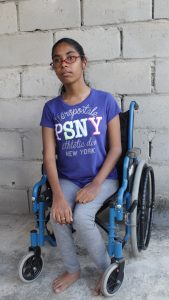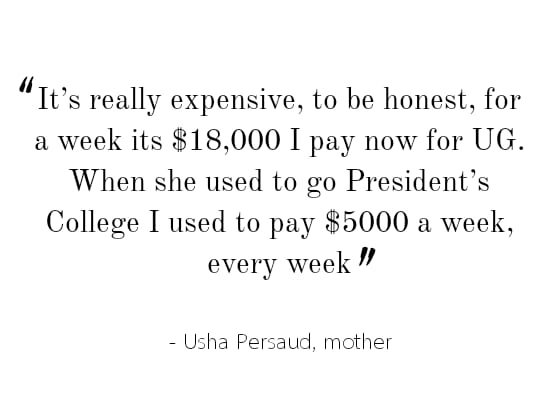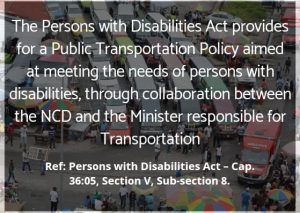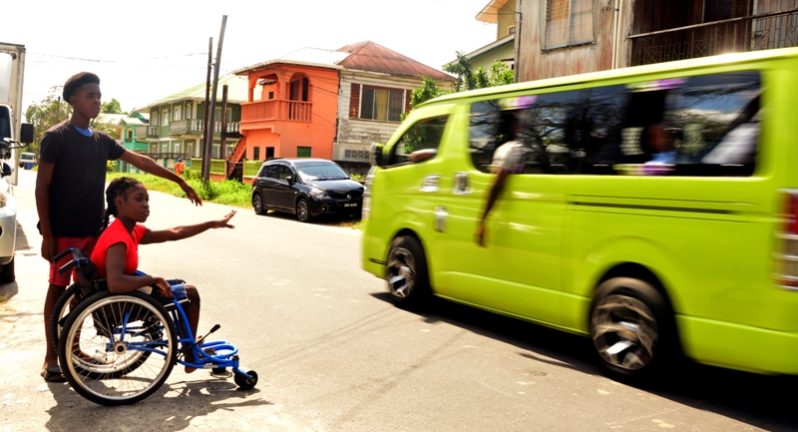By Naomi Marshall
Close to eight years after the Persons with Disabilities Act was signed into law, Guyana’s urban and rural transport systems remain a serious impediment to disability-inclusive development.
Section 5, Sub-Section 8 (Accessibility) of the Persons with Disabilities Act sets the foundation for a Public Transportation Policy aimed at meeting the needs of persons with disabilities but this is still to be materialised.
Today, those affected are calling on the authorities to give effect to the act that would allow them to participate in society unhindered.

For 18-year-old Rajni Persaud, a first year student of the University of Guyana pursuing a Diploma in Accountancy, easy access to transportation is key having been diagnosed with cerebral palsy when she was six-months-old.
Rajni has spastic triplegia cerebral palsy which causes stiffness in the muscles of the lower parts of her body, particularly her legs as well as her left arm. As such, she depends heavily on a wheel chair to move around.
Her mother Usha Persaud said transportation remains a stumbling block.
Usha had decided not to send her daughter to secondary school due to the high cost of transportation. The family resides at Coldingen on the East Coast of Demerara.

The mother of two has given up working to facilitate the movement of her daughter.
In an effort to facilitate persons with disabilities particularly those in wheel chair, Usha recommends that each Local Authority Area (LAA) be equipped with a special bus to accommodate this population. She believes there are many more persons who would like to be engaged in society but feel that their needs are not accommodated.
Twenty-four-year-old Daycia Haynes of Norton Street, Georgetown, who is unable to walk, said she no longer uses minibuses to move around. In order to facilitate her studies at the Guyana Society for the Blind and the Open Doors Vocational Centre for Persons with Disabilities, her mother paid a hefty taxi bill monthly. To test the system on Tuesday, Haynes and her friend Robert Griffith stood for approximately 30 minutes attempting to flag down a minibus but to no avail.
Ganesh Singh, a commissioner on the National Commission for Disability (NCD), said the public transportation sector remains a sore point for persons living with disabilities particularly those in wheel chair. He hopes soon the government in collaboration with the NCD can put a system in place that would be inclusive.

President of the United Minibus Union (UMU), Eon Andrews said there are not many persons in wheelchairs who use minibuses. He, however, admitted that persons with different types of disabilities suffer terribly at the hands of public transportation operators. Andrews believes that the government should provide special buses to facilitate persons with disabilities.
Minister of Public Infrastructure, David Patterson, who has responsibility for transportation, said the Public Transportation Policy is in draft. According to him, the Government is working to have the document finalised but he did not specify a timeline.
Meanwhile, Chairman of the Guyana Council of of Organisations for Persons with Disabilities, Leon Walcott said, to buy-in support from minibus and taxi operators, special commissions should be offered.
Allick Khan, a driver who plies the East Coast Demerara route, said he would endorse a ticket system that would see drivers receiving commissions for transporting persons with disabilities.



.jpg)








